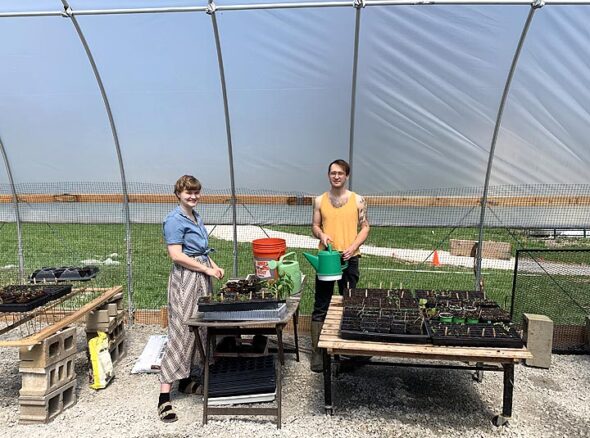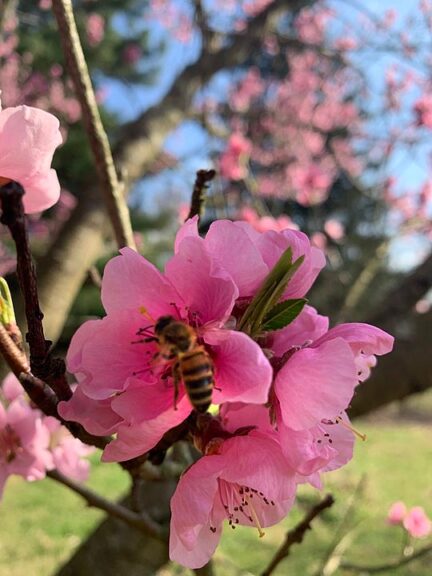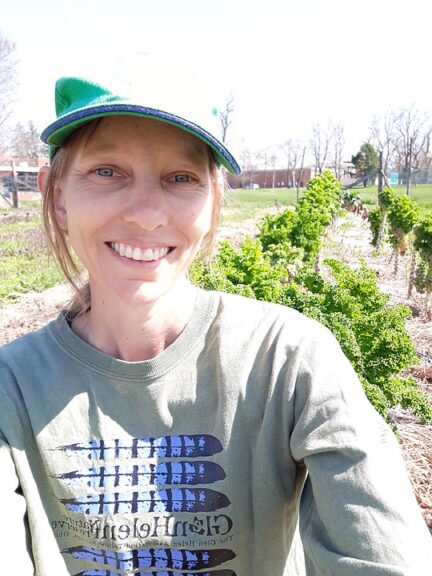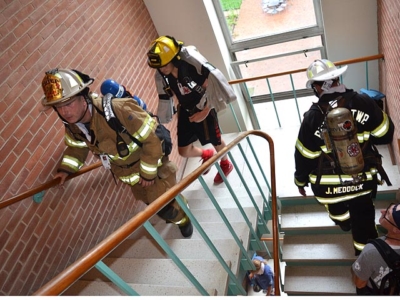
Gabby (right) and Selena Loomis-Amrhein tended starts in the Agraria hoop house, erected last summer with the help of community members. Agraria is growing produce to supply area food banks, as well as collaborating with local organizations to help new gardeners get started with growing their own food. (Submitted photo)
Local farmers eye uncertainty
- Published: April 11, 2020
EDITOR’S NOTE: The News is making all of its coverage on the COVID-19 crisis free and immediately available to the community. To support our work, please consider a subscription today. Go to https://ysnews.com/subscribe to subscribe now.
Ohio’s “stay-at-home” order has brought many aspects of life to a standstill, but spring keeps rolling on.
Bluebirds are nesting in boxes around the Antioch Farm, where farm manager Kat Christen saw her first scarlet tanager this week. At Flying Mouse Farms on Fairfield Pike, peach trees are blossoming, drawing bees. And in hoop houses at Agraria and Heartbeat Learning Gardens, tender vegetable starts are flourishing.
Life and growth are happening on local farms against the backdrop of massive shutdown and uncertainty due to the coronavirus pandemic. Locally, farmers are an essential part of the food supply, yet many are worried about whether and how they’ll be able to find local buyers amid new social distancing measures and state-mandated closures of many area businesses and institutions.
“We don’t know what markets are going to be like,” Michele Burns of Flying Mouse Farms, which sells produce, meats and maple syrup, said this week.
The question is especially pressing for Burns, who in addition to being co-owner of Flying Mouse Farms, is the organizer of the Yellow Springs Farmers Market, home to dozens of vendors including Flying Mouse and Peach Mountain Organics, which sells about half of its produce at the Yellow Springs market.
Scheduled to open last week for the season, the local market is being revamped. It is unlikely to return this season in its traditional form, according to Burns. Social distancing is difficult or impossible to maintain at most farmers markets, which revolve around close social contact, she explained.

The bees are buzzing at Flying Mouse Farms, pollinating the farm’s peach trees. (Submitted photo)
“The biggest problem is congregation. But that’s what a market is,” she said.
Nationwide, alternative market channels such as farmers markets, direct-to-consumer and farm-to-institution outlets could collectively face a decline of $688 million in sales between March and May of 2020, according to a fact sheet from the Ohio Ecological Food and Farm Association, or OEFFA.
Sustainable and organic farmers depend on alternative markets, and communities in turn depend on these markets for fresh, locally grown food, the OEFFA notes. The group is urging Gov. Mike DeWine to enact a variety of measures to support smaller and organic farmers and the alternative markets critical to their livelihood. The federal coronavirus stimulus bill, passed in March, included $9.5 billion to help livestock producers, dairy farmers, specialty crop farmers and local agricultural groups.
“It’s a really great first step,” Amalie Lipstreu, policy director of the OEFFA, said of the farm-focused stimulus during a March 27 call with the Ohio Food Policy Network. But ensuring that the money goes to local food will be the challenge, she acknowledged.
Meanwhile, farmers markets all over the state are being postponed or adapted to online, curbside or drive-through formats, according to Burns. She is exploring a drive-through model for the Yellow Springs market. Last weekend, instead of a multi-vendor launch in the customary parking lot of Kings Yard, the local market saw a small trial run as a drive-through market with two vendors at Yellow Springs High School.
“It wasn’t perfect. There are still some things to work out,” Burns said, among them how to handle payments in a safe and efficient manner and how to incorporate SNAP benefits, which serve low-income families.
Doug Seibert of Peach Mountain Organics took part in the trial run. He sold out in the third hour, and said he was impressed by how calm and orderly the car-only market was.
“People were amazingly cool about things,” he said.
Seibert said he remains unsure exactly how his diverse 30-year organic farming operation will sell its produce this year. But he is planting as usual, he said, and hopes to bring on his crew of four workers as the season wears on.
“I’m not acting like anything’s changing,” Seibert said.
That resolve to plant and harvest more or less as usual — though with social distancing measures in place — was echoed by other farmers this week.
Nicole Manieri, co-owner of Heartbeat Learning Gardens, said her farm is in the midst of a transition from a CSA to an educational nonprofit. That shift is still happening, with the educational component moving online for now. The farm will offer an herbal CSA this summer, but its former vegetable CSA is being discontinued. Instead, the farm is growing produce to help supply a Springfield food bank.

Antioch Farm Manager Kat Christen is planting less this spring, gearing up for fall and expanding into online teaching. (Submitted photo)
“We are trying to reach the people and families that don’t have access to food,” Manieri said, noting that the south side of Springfield is now a food desert, with the Kroger in the area having recently pulled out.
The 15-year-old farm has long been committed to local food systems, home gardens and diverse ecology, she said. The current crisis has just deepened that commitment.
“We feel the need for what we’re doing amplified,” Manieri said.
Susan Jennings, executive director of Agraria, shares that perspective. In the midst of sweeping economic and social changes, global food systems are stressed as never before, she said. And local food is a powerful answer to the breakdown of global systems.
“There is a huge reset happening economically,” Jennings said. “People are more aware than ever that cheap food is not necessarily the most food-secure.”
As a local nonprofit dedicated to regenerative agriculture, Agraria already has research and partnerships focused on these topics.
“Food security and food systems planning was already on our agenda, but [the pandemic] has added it as an immediate, short-term focus,” she said.
In response to the coronavirus crisis, Agraria has launched several new programs in partnership with Antioch College and Heartbeat Learning Gardens. A “generous gardeners” program will help people who are new to gardening and looking to supplement their food budget by growing their own food.
“It gives people a lot of agency, and contributes to their food security,” Jennings said.
Online classes filmed with area experts will guide people in planting and tending their own gardens.
Another program will link novice gardeners with expert mentors. And yet another program encourages experienced gardeners to “grow a row” — plant an extra row in their gardens to help address local food needs.
Like Heartbeat Learning Gardens, Agraria is planning to grow vegetables this season for area food banks to address food insecurity in Dayton, Springfield and Yellow Springs.
And both organizations are growing more starters this year to help those who wish to plant a garden get a leg up. Peach Mountain Organics, too, is planning to offer more starters; customers are already calling up the farm inquiring about them, Seibert said.
As for Antioch Farm, the college’s signature farm program is up and running, though Christen said she is planting less this spring. Only a few students are sheltering in place on campus, college classes have gone online and staff are working from home. Christen and three student workers are gearing up for the fall, preparing beds now for fall planting.
“There’s plenty to do,” she said.
To keep workers safe, Christen is staggering farm shifts and making sure that no more than two workers are on the farm at a given time — and that they keep a healthy distance away from each other.
“A farm is a great place to work in this crisis,” she said. “For mental health, it’s been really nice.”
Christen also has been giving garden consultations — remotely — and she’s been pleasantly surprised by how well she and other gardeners can collaborate by swapping photos on their phones.
“People are really turning to gardens right now,” she observed, likening the surge in interest to the “victory gardens” that were widely planted during World War II. Seed companies are reaching capacity, and orders are running a bit behind, but seeds are still available, she said.
Planting a garden can make a big difference to the health of families and communities, Christen said.
“If we all had 10 foot by 10 foot gardens, there would be a significant amount of nutrition for families,” she said.
Beginning this week, Christen and co-op faculty member Beth Bridgeman will be teaching an online “home foods” gardening course open to students for credit and college staff on an audit basis. There may be a section offered to community members, as well.
Earlier this week, with sunny spring weather on full display, Christen already had a few words of advice for aspiring local gardeners.
“Right now in the Miami Valley people can plant peas and potatoes without cover,” she said. “Potatoes and peas. Do it now!”
One Response to “Local farmers eye uncertainty”
The Yellow Springs News encourages respectful discussion of this article.
You must login to post a comment.
Don't have a login? Register for a free YSNews.com account.













Enjoyed this article so very much. It is uplifting and hopeful. It gives people concrete action to keep busy and stay healthy and learn the joy of gardening.